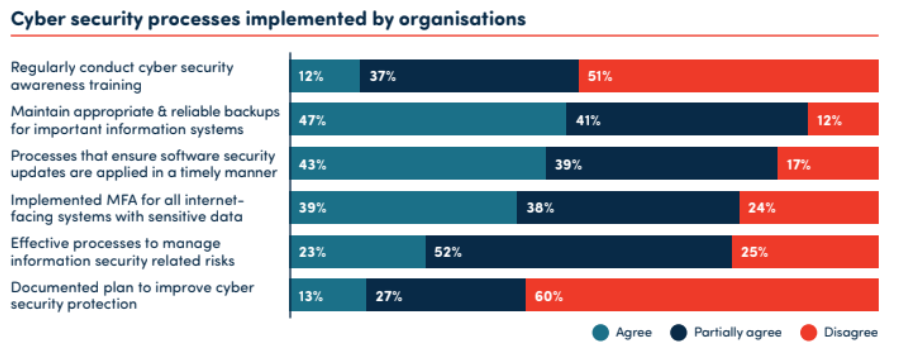Products You May Like
The not-for-profit sector is one of Australia’s biggest employers and revenue sources. 1.4 million individuals work within the not-for-profit sector in Australia, and one other 3.2 million individuals volunteer. The general income of the sector is $190 billion, and that cash goes straight into supporting crucial causes throughout the nation.
Sadly, based on new analysis by Infoxchange, the sector is ill-equipped to deal with the safety necessities of contemporary IT environments, and that isn’t solely placing shut to 5 million individuals in danger, nevertheless it’s additionally inhibiting the NFP sector’s skill to handle Australia’s most urgent humanitarian and social justice challenges.
Soar to:
NFP cyber safety insights from Infoxchange
Infoxchange’s Digital Expertise within the Not-For-Revenue Sector gives a deep dive into the dominant developments dealing with charities and nonprofits with expertise, based mostly on a survey of greater than 1,000 organisations within the sector. Insights embrace:
- One in eight surveyed organisations had skilled a cyber safety incident prior to now 12 months.
- Solely 23% had efficient data safety processes in place, permitting employees and volunteers to safeguard the organisation’s knowledge.
- Simply 39% had applied multi-factor authentication for internet-facing techniques with delicate knowledge, whereas a mere 13% had a documented plan to enhance cyber safety safety.
- A mere 12% of NFPs carried out common cyber safety consciousness coaching, and just one in 5 had a cyber safety coverage in place.
These NFPs do perceive the significance of digital modernisation. Elsewhere within the report, 45% stated that they had already moved the “majority” of their IT to the cloud. NFPs are additionally deeply within the potential for expertise to reinforce their communications, with 38% saying that bettering their web site was their key precedence wanting ahead. In the meantime, 32% stated that making higher use of digital advertising was the principle expertise aim.
Lack of help leaves NFPs with poor safety practices
And but with no cyber safety query did the bulk “agree” that they have been working based on finest practices (Determine A).
Determine A

“Despite this massive footprint in our economy and in our lives, charities and not-for-profits have not been provided with the support they need to deal with an increasingly sophisticated level of cyber attacks,” stated David Crosbie and Tim Costello AO, from the Neighborhood Council for Australia, in a joint assertion. “Not like companies, charities spend each spare greenback they will discover on serving their communities.
“Allocating more resources to strengthen cyber security would mean reducing the level of services available in our communities. Many charities and NFPs struggle to withdraw services, even though cyber security is clearly an important priority.”
The influence of poor safety
In August, information broke that the information of as many as 50,000 donors — affecting as much as 70 NFPs, together with main charities reminiscent of Fred Hollows Basis, Most cancers Council and Canteen — had been leaked and published on the dark web.
This was as a result of NFPs partnering with the flawed organisation — on this case, Pareto Cellphone for telemarketer providers — nevertheless it highlights the low ranges of safety concern or consciousness amongst many charities.
Organisations are obliged to make sure third-party companions are accountable shepherds for buyer knowledge.
Individually, in 2022, one other main Australian charity, The Smith Household, was focused straight by hackers and had critical data of around 80,000 donors, together with bank card and private data, stolen.
NFP’s lack of safety consciousness is exposing themselves to authorized legal responsibility
As famous by Moores, a authorized agency that specialises in supporting charities and different “social good” organisations, the impacts of cyber breaches on NFPs are notably damaging.
SEE: Australian enterprises are taking an “assume-breach” approach to cyber security.
“Unfortunately, many charities and NFPs are susceptible to cyber security attacks due to low levels of cyber resilience,” the agency noted in a blog. “For a charity or NFP, failing to take appropriate action to secure data could mean: The exposure of sensitive information of beneficiaries, donors or members; the loss of charity funds and resources; reputational damage; and breach of legal obligations.”
And but, regardless of these issues and the difficulties NFPs face in financing safety, there seems to be little effort on any degree to handle the problem.
For instance, the Neighborhood Council for Australia is utilizing Infoxchange’s report back to foyer the Prime Minister, claiming that the 2023–2030 Australian Cyber Safety Technique dialogue paper (together with the “six shields” concept) fails to particularly acknowledge charities and not-for-profits, regardless of their important contributions to the Australian workforce, GDP and group well-being.
“It has never been more important to build the digital capabilities and resilience of the not-for-profit sector,” Infoxchange CEO David Spriggs stated in a launch, supporting the requires extra strategic and nationwide help for NFPs and cyber safety. “As Australians bear the brunt of the cost-of-living crisis, this is putting greater pressure on not-for-profits and local community organisations who are at the front line in responding to record levels of service demand.”
A back-to-basics method
It’s unlikely that NFPs are going to see a sudden inflow of price range to enhance their safety place. In lieu of that, IT professionals working in NFPs ought to undertake a “back-to-basics” method to IT safety and guarantee that, on the very least, organisations are following these finest practices.
Educate and prepare employees
The primary line of defence in cyber safety is commonly the customers themselves. IT professionals ought to conduct common coaching classes to coach employees in regards to the newest cyberthreats and acknowledge them. This consists of phishing scams, malware and ransomware assaults.
Implement robust password insurance policies
One space the place there may be robust consciousness amongst NFPs is within the worth of robust password and password management policies that embrace two-factor and multi-factor authentication. IT professionals ought to be seeking to roll out probably the most strong zero-trust insurance policies potential, particularly for these NFPs which are working predominantly within the cloud.
Commonly replace and patch techniques
Cyberthreats are consistently evolving, and outdated software program can have vulnerabilities that hackers can exploit. Commonly updating and patching all systems is essential to conserving them safe.
PREMIUM: Make the most of this patch management policy.
Set up and replace safety software program
Use dependable security software that gives real-time safety towards malware and different cyberthreats. Many fashionable safety software program packages have synthetic intelligence inbuilt, which is crucial to leverage when human assets are scarce.
Again up knowledge repeatedly
Common data backups are important for recovering from cyberattacks. Backups ought to be made incessantly and examined repeatedly to make sure they are often restored if wanted. It’s additionally vital to retailer backups securely, both off-site or within the cloud, to guard towards bodily injury or theft. As a defence towards ransomware, safety groups ought to be on the lookout for backups which have an “air gap,” too, stopping the ransomware from reaching the backup knowledge.
Put money into managed providers
NFPs ought to think about investing in managed services to help their inside groups. The safety upshot to shifting work into the cloud is that safety groups can help the organisation remotely, and plenty of MSPs with a safety bent do specialize in supporting small and under-resourced organisations.
